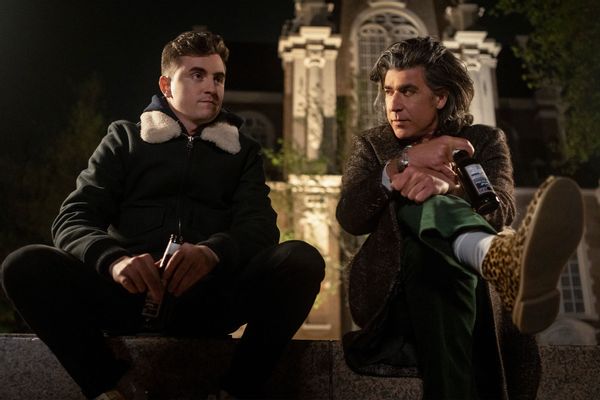
Earlier this season, "Ted Lasso" introduced a troubling storyline. Footballer Colin (Billy Harris), long suspected by watchful viewers to be gay after he corrected his Richmond teammates on the proper spelling of Grindr, hard launched a boyfriend, kissing goodbye to Sam Liu's Michael before heading out to train. Here's the troubling part. Trent Crimm (James Lance), formerly of The Independent and now writing an H. G. Bissinger-style book about the team, witnessed the two kissing again later in an alley at night, and started following Colin. The Apple TV+ show pretty heavy-handedly expected us to believe Trent would out the athlete.
The show is tolerating them, but their storylines are miserable.
That's not been the case, thankfully. But also troubling? Colin introduced Michael to his teammates — who by all means appear supportive, behaving as if positive masculinity was their true sport and spouting wisdom it would likely take years of therapy to instill — as a friend only and as "the world's greatest wingman." Not as his boyfriend. Perhaps the most troubling? Popular PR boss Keeley's relationship with a woman is doomed before it even really begins, because something is terribly wrong.
In earlier seasons, "Ted Lasso" was rightfully criticized for its lack of queer characters. This season it seems to be throwing multiple examples at us. See? They're gay or bi! But none of its queer characters appear well-rounded. They won't get lasting love or happiness or escape trauma. The show is tolerating them, but their storylines are miserable.
As The Advocate writes, "After two and half seasons, 11 Emmy Awards, and a recent visit to the White House, 'Ted Lasso' has finally acknowledged its LGBTQ+ characters." But the experiences of those characters are largely rooted in misery. A professional athlete, Colin is closeted, even from his teammates, who are all now close friends. When Trent follows him into a gay bar in Amsterdam, Colin's so terrified, he pretends to have a made a mistake and walks out. Given the journalist's past treatment of mental health issues in his reporting, Colin is right to be alarmed. But Trent, like Nate (Nick Mohammed), is undergoing a massive character shift, faster than Nate's hair turned gray (and the coach shifted from kind to evil now back to kind again; it's enough to give you whiplash).
It's hard not to wonder if Trent's queerness was a last minute revision, meant to quell the criticism of the show.
Trent hasn't been following Colin to write about the athlete's sexuality but to give him solace. Trent is queer too. It's a meaningful connection, and it could be a lovely, important moment, especially given the lack of LGBTQ+ elders not only in Colin's life (the little that we know about it) but on television in general. The two share a conversation by the river together, then back to a gay bar for a night of dancing, of being yourself, at least in the darkness.
But it's a subplot also tinged in sadness and difficulty. Trent is not out to the team or the people at Richmond either, even to friends like Ted. Trent also has a young daughter with a woman and has only recently come out to the mother of his child. While it's not the most unrealistic of storylines, it's perhaps not the happiest, either. It's hard not to wonder if Trent's queerness was a last-minute revision, meant to quell the criticism of the show.

In a rosy show where bad boys mature into Jedis basically overnight, why can't gay characters be happy?
Keeley's queer relationship is also doomed after two episodes. Because Jack is love-bombing her, a warning sign of an abuser, where someone shows a partner elaborate displays of affection as a kind of manipulation in the beginning, only to tear the person down later after the honeymoon period is over. In case we don't get it, the show tells us this. Repeatedly. Keeley and Rebecca have a dinner together where Rebecca brings up her cheating and cruel ex Rupert as a comparison to Jack, which is possibly the most obvious move the show could have made. If we don't know Jack is trouble, we know now. Jack also flat-out tells Keeley she's jealous — so much so she's willing to deface a first edition Jane Austen.
Frustratingly, it feels as if "Ted Lasso" wants so desperately for Keeley and Roy to eventually end up together, that the show won't take a relationship between two women seriously. Such a decision plays into the trap that bisexuality isn't real, that this is just a stage fun-loving gal Keeley's going through and of course, she'll return to Roy.

Props to the show for avoiding homophobia when it comes to Keeley (or rather, Jack) announcing her queer relationship, and when it comes to other characters — including both her ex-boyfriends — finding out. They simply accept it, make no comment. But that goodwill erodes slightly when Ted makes comments like how he was "compelled to express my individuality. Since I was a straight fella in Middle America working in sports, and I was scared of tattoo needles, the only option for me to do so was through my facial hair." Wait. What? "Ted Lasso" has slid by on niceness for a long time. But in the immortal words of Stephen Sondheim's Little Red Riding Hood, "nice is different than good." And the Ted Lasso way may be losing its way, particularly when it comes to LGBTQ+ characters who are more than stereotypes and who face more than sadness.
Homophobia is a real and urgent issue in sports, perhaps particularly in soccer where a bigoted and popular chant is a punishable offense in England and has stopped games elsewhere. "Ted Lasso" has missed the opportunity — so far — to have an out athlete. Or, any queer character who isn't tragic. And in a rosy show where bad boys mature into Jedis basically overnight, why can't gay characters — yes, even athletes — be happy? Why can't they be out? Why can't they have the fully realized lives that the straight characters do and be allowed to be themselves, to live and to love, without the show punishing them?







